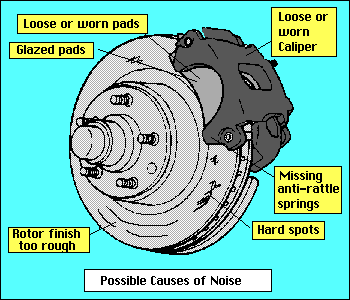Causes of Brake Noise:
Low frequency vibration: Judder
Low frequency vibration is a deep noise and is often described as judder. Common reasons for this kind of noise are poor fitment of the disc brake onto the hub, “runout”, excessive disc thickness variation or general disc damage.
Medium frequency vibration: Squeal
Medium frequency vibrations are heard as brake squeal and commonly originate from vibrations in the caliper piston. However, there are a number of reasons why this kind of noise can occur. If the caliper piston or any sliding part of the caliper is sticking, it can cause noise. Also, incorrect pad fitting or a brake disc that is below its minimum thickness can cause this noise too.
High frequency vibration: Squeak
Brake squeaks are produced by high frequency vibrations, which are normally due to molecular vibration within the friction material during its application to the brake disc. This is normally an indication that the brake pads are due for replacement.
Brake pads are one of the best indicators of the condition of a vehicle’s braking system. Just as tyre tread markings indicate incorrect inflation pressure or tracking errors, brake pad appearance can highlight possible issues with the braking system. If, for example, one or more brake pads within an axle set are excessively worn, this is an indication that the caliper guide pins or piston are sticking. The vehicle may pull to one side and experience squeal and judder while braking.


If i stop descending on a steep hill, then release the foot brake pedal just slightly, there is some noise that comes out of the brakes. What could be the problem?